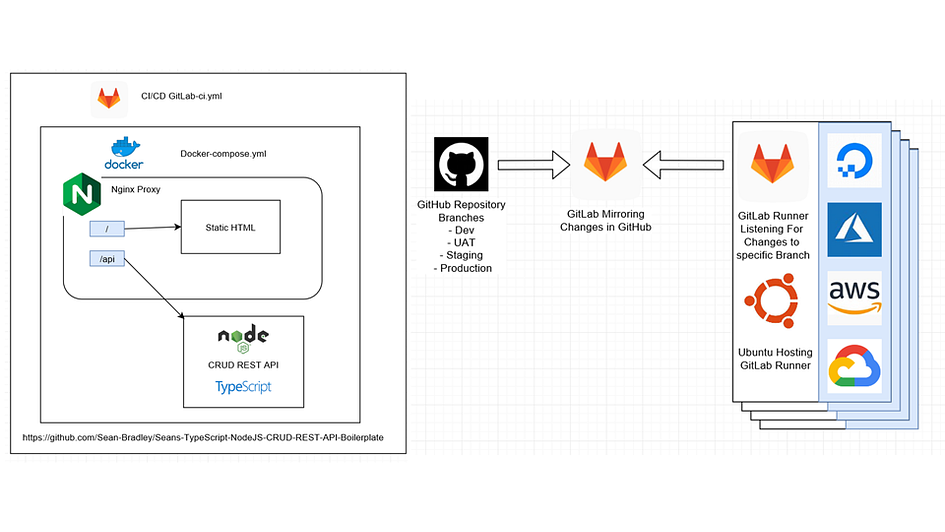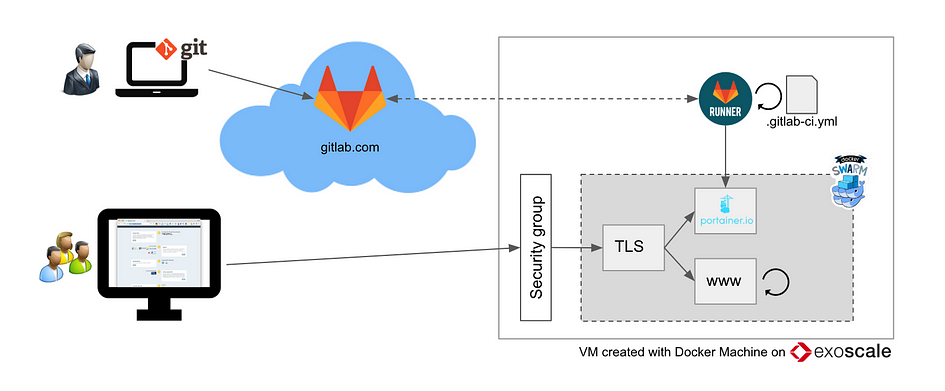Deep Learning Computing CI/CD Framework
Overview
POCs on Small changes from Open Source
- Non-GPL license Open source projects are good basements to add value as POC espcially on Deep Learning areas.

POCs on Short but Full Cycle Deployments
-
Projects use git/yaml script to setup CI/CD pipeline and deployment flows.
-
Easy to trasnfer from localhost to server via gitlab-runner


Deployments based on Docker/K8s for Scalablity, Portablity
- Docker/K8s based deployment for scaiblity, portablity

All POCs setups as a Ecosystem
Live sites
Gitlab server
| Git Repo | Status | Progress | Comments |
|---|---|---|---|
 |
 User=root User=root  |
Current runners
| Servers |  |
OS |  |
Monitoring |
|---|---|---|---|---|
 |
dlc | Ubuntu18.04 | dlc, ubuntu, GPU |   |
 |
dlc1 | Ubuntu18.04 | dlc1, ubuntu, GPU |   |
 |
dlc2 | Ubuntu18.04 | dlc2, ubuntu |  |
How to setup dlc/dlc1 to run a TensorFlow GPU project
with Gitlab runner
Step 1: Add project to Gitlab https://tailab.dlc.com:9443/deeplearningcomputing
Step 1.5: If your project is in https://git.dlc.com/
You will need to import your project for gitlab CI/CD only by add your project into https://tailab.dlc.com:9443/root/git-sync-mirror. After that, bitbucket code will be automatically syced to gitlab server.
Step 2: Enable dlc gitlab runner and setup CI/CD
Step 3: See the CI/CD results
with ssh or RDP + admin account
Step 1: Check with wj.lee@dlc.com and ask for admin account of dlc
Step 2: With ssh or RPD to login to dlc
How to setup your runner- How to install gitlab-runner in your ubuntu
Step 1:
Step 2:
Step 4:
or
Step 5.1:
First, by command line for docker gitlab-runner
PS: YOUR-TOKEN can be obtained from Gitlab Server, in top menu, Admin Area->Runners to get the registration token. If you have no idea how to get '/etc/gitlab-runner/certs/ssl.csr', please check step XX.
Second, by command line for shell gitlab-runner
Step 6: Allow passwordless sudo
execute
if no joe command, please install
Step 6.1: Modify /etc/gitlab-runner/config.toml
and change concurrent from 1 to 40 or more. Also, for shell runner, please also add
Step 7: Install git-lsf
Step 8: Verify gitlab-runner
Step 9:
For ubuntu 20.04, please do this to prevent Gitlab runner shell executor doesn't work on Ubuntu focal
Step X: If you want to upgrade gitlab-runner
This is optional step. If you want to upgrae gitlab-runner to newest one. Please do the following commands
Step XX: If you met the problem like below or you have no idea how to get '/etc/gitlab-runner/certs/ssl.csr'
References
- Even the Smallest Side Project Deserves its CI/CD Pipeline
- GitLab Auto DevOps 深入淺出,自動部署,連設定檔不用?!
- Install Blackbox Exporter to Monitor Websites With Prometheus
- Adding Custom badges 📛 to Gitlab...
- Dynamic badges using shields.io
- Dynamic Badges with Shields.io and Runkit
- Markdown code for lots of small badges 🎀 📌 (shields.io, forthebadge.com etc) 😎
- Continuous Delivery for Machine Learning- Automating the end-to-end lifecycle of Machine Learning applications
- Welcome to The Hitchhiker’s Guide to PlantUML!
- 使用 OPENSSL 產生 SSL 憑證需要的 KEY 與 CSR
- OPENSSL常用語法彙整
- [Linux] GitLab Runner 證書錯誤註冊失敗 (x509: certificate signed by unknown authority)